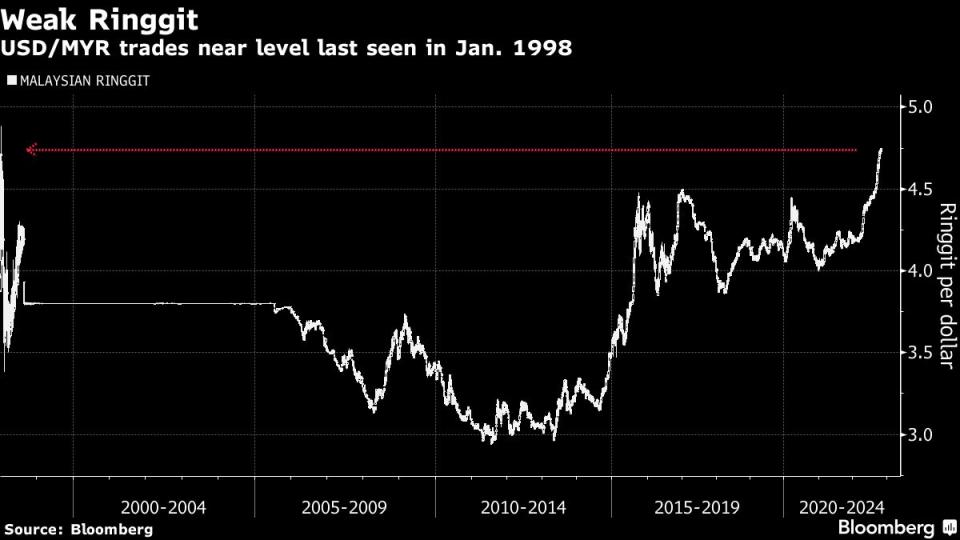Malaysia Raises Key Rate by a Quarter Point Ahead of Vote
(Bloomberg) -- Malaysia increased its benchmark interest rate for a fourth straight time on Thursday, weeks ahead of a general election where rising living costs and the ringgit at a 24-year low will emerge as key issues for voters.
Most Read from Bloomberg
Blackstone’s $70 Billion Real Estate Fund for Retail Investors Is Losing Steam
Musk Eliminates ‘Days of Rest’ From Twitter Employee Calendars
Lottery Winner Keeps $30 Million Jackpot Secret From Wife and Child
How a Mysterious China Screenshot Spurred $450 Billion Rally
Bank Negara Malaysia raised the overnight policy rate by 25 basis points to 2.75%, a move seen by 22 out of 24 economists in a Bloomberg survey. The rest had predicted no change.
The latest tightening will “pre-emptively manage the risk of excessive demand on price pressures consistent with the recalibration of monetary policy settings that balances the risks to domestic inflation and sustainable growth,” BNM said in statement. The central bank reaffirmed that it is not on any “pre-set” rate course and that decisions will remain data driven, “measured and gradual.”
BNM is under pressure to keep inflation in check while supporting growth as campaigning heats up for the Nov. 19 vote. Nearly 80% of respondents in a recent survey said that the government’s priority should be either restoring and boosting the economy, or combating poverty and managing living costs.
Why Malaysia Has Early Elections and What Is at Stake: QuickTake
At the same time, the US’s aggressive tightening has led to a persistently strong dollar environment, affecting major and emerging market currencies including the ringgit, BNM said. The Federal Reserve raised rates by 75 basis points for a fourth consecutive time hours earlier.
Malaysia’s main stocks index extended losses to as much as 2.1%, with the bulk of the decline coming before the rate decision. The ringgit traded at 4.7463 per dollar, poised for a sixth day of losses. The currency has slumped about 14% against the greenback this year to its weakest level since January 1998.
“Rate hikes are still needed, given the rate of inflation, but it is not obvious to me that BNM has to match the Fed,” said Aninda Mitra, a macro and investment strategist at BNY Mellon Investment Management in Singapore. “On a trade-weighted basis, ringgit’s doing fine.”
While price pressures likely peaked in the third quarter and should moderate, headline and core inflation are expected to remain elevated, BNM said. The balance of risk to next year’s inflation outlook is tilted to the upside, it said.
Core inflation, which strips out volatile food and fuel items, quickened to the most since at least 2015, in September. Price gains are set to stay elevated next year should the government go ahead with plans to end blanket subsidies on fuel and cooking oil.
At the same time, economic activity strengthened further in the third quarter and despite a challenging global environment, consumption and tourism are counted on to support growth, the central bank said, as it repeated a pledge to keep monetary policy accommodative.
Headwinds
Future rate decisions would have to take into account the impact of an imminent global slowdown on the export reliant nation. The central bank also warned Thursday of headwinds toglobal growth from tighter financial conditions, sustained price pressures and challenges in China.
Threats of recession in many economies could have deep repercussions to Malaysia, which counts China and the US as among its biggest trading partners. The government last month said gross domestic product will expand between 6.5% and 7% this year, before easing to between between 4% to 5% growth in 2023.
BNM’s room to tighten is limited, according to Wellian Wiranto, an economist at Oversea-Chinese Banking Corp in Singapore. “It is likely to take just one more hike in early next year and perches itself to survey the global growth landscape more carefully to assess any need to move further,” he said.
--With assistance from Cecilia Yap, Chester Yung, Matthew Burgess and Karl Lester M. Yap.
(Updates with comments from statement, analysts)
Most Read from Bloomberg Businessweek
Yeezy Roller Coaster Ended With Two-Minute Phone Call at Adidas
Fast Fashion Waste Is Choking Developing Countries With Mountains of Trash
These Five Women Are Helping Doctors Crack the Long-Covid Mystery
A Practical Way to Make Sense of All the Shocks Hammering the Global Economy
©2022 Bloomberg L.P.



